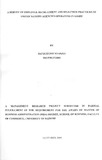| dc.description.abstract | The research project aimed at addressing the following research question: “What staff
recruitment and selection practices are used by UN agencies operating in Gigiri?” A survey was
undertaken targeting fifteen (15) UN agencies operating in Gigiri. The study utilized
questionnaires to collect primary data from the fifteen (15), however, only thirteen (13)
questionnaires were collected from the respondent organizations. The data was then analyzed
using MS-Excel 2007 and the findings presented using tables giving descriptive statistics
including frequencies, mean and percentages.
The research findings showed that majority of the agencies had a HR department which is
charged with the responsibility of employee recruitment and selection; and that most of the
agencies had between twenty to thirty nine employees. This research finding led to the
conclusion that indeed majority of UN agencies operating in Gigiri undertook employee
recruitment and selection within the organization and that they were recruiting and selecting a
considerable large number of staff and hence, there was an employee recruitment and selection
practice that was adhered to.
The researcher made the following recommendations: First and foremost, UN agencies in Gigiri
should increase the use of transfers and promotions, media advertisements, target sourcing,
poaching/raiding, recruitment agencies, retired/retrenched employees, educational institutions,
public employment agencies and unsolicited applicants as recruitment sources, as this will
ensure that the agencies accord themselves with human resource from external sources which
could in turn, come in with new and/or different experience and work culture. Secondly, the UN
agencies should increasingly utilize psychometric tests and aptitude tests as these employee
selection practices ensure that the employees are best suited with their respective job
descriptions based on their knowledge, skills, abilities and experience. Thirdly, the researcher
recommended that the UN agencies should continue selecting employees both internationally
and locally based on qualification, professionalism, competence, experience and past
performance. The use of interviews, application forms and short listing by the agencies is also
equally recommended. Finally, the researcher recommended that the UN agencies should review
their recruitment and selection policy, allocate more resources to ensure effective HR planning
and increase their budgetary allocation to ensure that funds are sufficient. The agencies should
also continually improve on the employment conditions and put in place training programs that
can ensure that their manpower remains well informed and equipped with the necessary
knowledge and skills relating to their respective job. | en |

